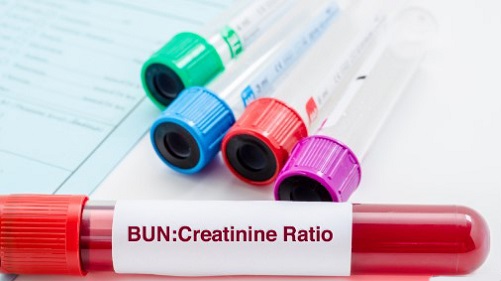High BUN-Creatinine Ratio Signals Higher Mortality Risk in ICU Patients with Blood Clots
Nikhil Prasad Fact checked by:Thailand Medical News Team Jun 14, 2024 1 year, 8 months, 2 weeks, 5 hours, 19 minutes ago
Medical-News: A recent study reveals a significant finding: the ratio of blood urea nitrogen (BUN) to creatinine, commonly referred to as BCR, is closely associated with in-hospital mortality among critically ill patients suffering from venous thromboembolism (VTE). This discovery could help healthcare professionals better identify high-risk patients and improve outcomes.
 High BUN-Creatinine Ratio Signals Higher Mortality Risk in
High BUN-Creatinine Ratio Signals Higher Mortality Risk in
ICU Patients with Blood Clots
Understanding Venous Thromboembolism (VTE)
VTE is a condition that includes deep vein thrombosis (DVT) and pulmonary embolism (PE). DVT occurs when blood clots form in deep veins, typically in the legs, while PE is a life-threatening condition where these clots travel to the lungs. VTE is a major concern for critically ill patients, leading to severe health complications and a significant risk of death.
The Study and Its Methods
The study, conducted by researchers Dr Anju Puri, Dr Mohan Giri, Dr Huanhuan Huang, and Dr Qinghua Zhao from The First Affiliated Hospital of Chongqing Medical University, Chongqing, China that is covered in this
Medical News report, analyzed data from the Medical Information Mart for Intensive Care IV (MIMIC-IV) database. This database includes detailed health records of patients admitted to the intensive care unit (ICU) at Beth Israel Deaconess Medical Center in Boston, Massachusetts, between 2008 and 2019.
The researchers focused on patients diagnosed with VTE upon ICU admission. They examined the relationship between BCR levels at the time of ICU admission and the likelihood of in-hospital mortality.
Key Findings
-Higher Mortality with Elevated BCR: Patients with a higher BCR at ICU admission had significantly higher in-hospital mortality rates. The optimal BCR cut-off value for predicting in-hospital mortality was identified as 26.84. Patients with a BCR above this threshold had a mortality rate of 22.6%, compared to 12.2% for those with a lower BCR.
Increased Risk Independent of Other Factors: The study adjusted for various potential confounding factors such as age, gender, comorbid conditions, and severity of illness. Even after these adjustments, the association between elevated BCR and increased mortality risk remained significant.
Useful Prognostic Tool: Given its widespread availability and ease of measurement, BCR could serve as a valuable tool for identifying high-risk patients in critical care settings. This simple blood test could help healthcare providers prioritize and tailor treatments more effectively.
Why BCR Matters
BUN and creatinine are waste products filtered by the kidneys. While BUN levels can fluctuate based on diet, medications, and other factors, the BCR provides a more stable indicator of kidney function. Elevated BCR levels can indicate issues such as dehydration, heart fa
ilure, or kidney dysfunction, all of which can complicate the treatment of VTE.
Practical Implications
-Early Identification: Monitoring BCR levels upon ICU admission can help identify patients at higher risk of adverse outcomes. This allows for timely interventions, potentially improving survival rates.
-Cost-Effective Measure: BCR is a cost-effective and easily obtainable measure, making it a practical tool for widespread use in ICUs.
-Improved Patient Management: Understanding the significance of BCR in critically ill patients can lead to better patient management strategies, including more aggressive treatment for those with elevated BCR levels.
Conclusion
The study underscores the importance of BCR as a predictor of in-hospital mortality among critically ill patients with VTE. As healthcare professionals seek to improve outcomes for these vulnerable patients, BCR measurement could become a standard part of ICU protocols, aiding in the early identification and management of high-risk individuals.
By integrating BCR monitoring into routine clinical practice, hospitals can enhance the care provided to critically ill patients, ultimately reducing mortality rates and improving overall patient outcomes.
The study findings were published in the peer reviewed journal: Frontiers in Cardiovascular Medicine.
https://www.frontiersin.org/articles/10.3389/fcvm.2024.1400915/full
For the latest
Medical News, keep on logging to Thailand Medical News.
Read Also:
https://www.thailandmedical.news/news/a-gut-microbial-metabolite-called-2-methylbutyrylcarnitine-causes-covid-19-individuals-to-have-higher-risk-of-blood-clot
https://www.thailandmedical.news/news/medical-news-researchers-claim-that-fibrinaloid-microclots-could-be-behind-atrial-fibrillation-relevant-for-sars-cov-2-context
